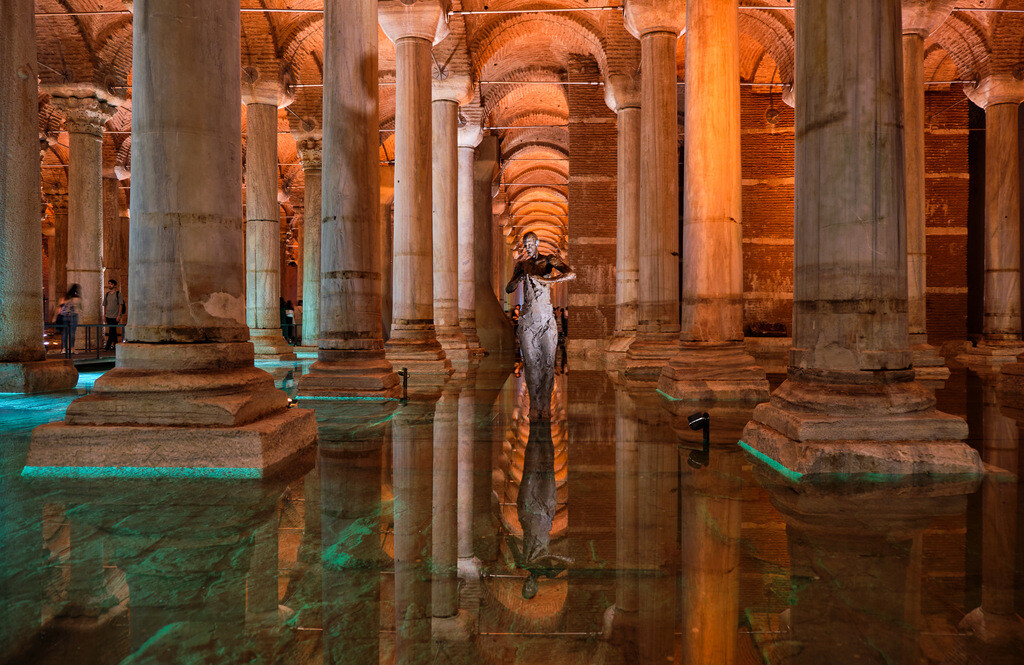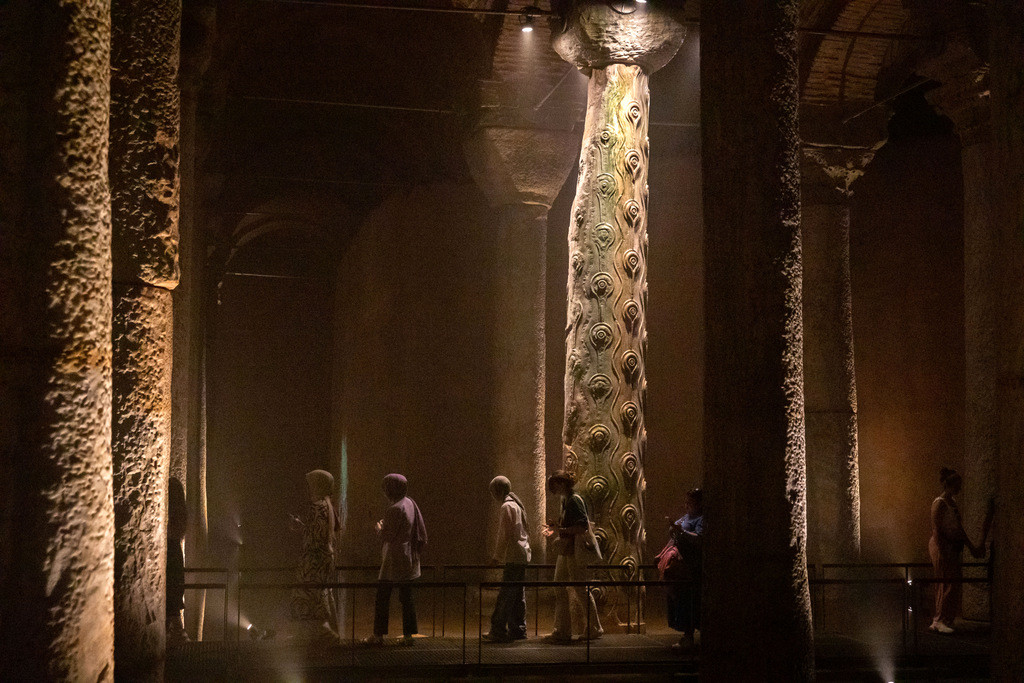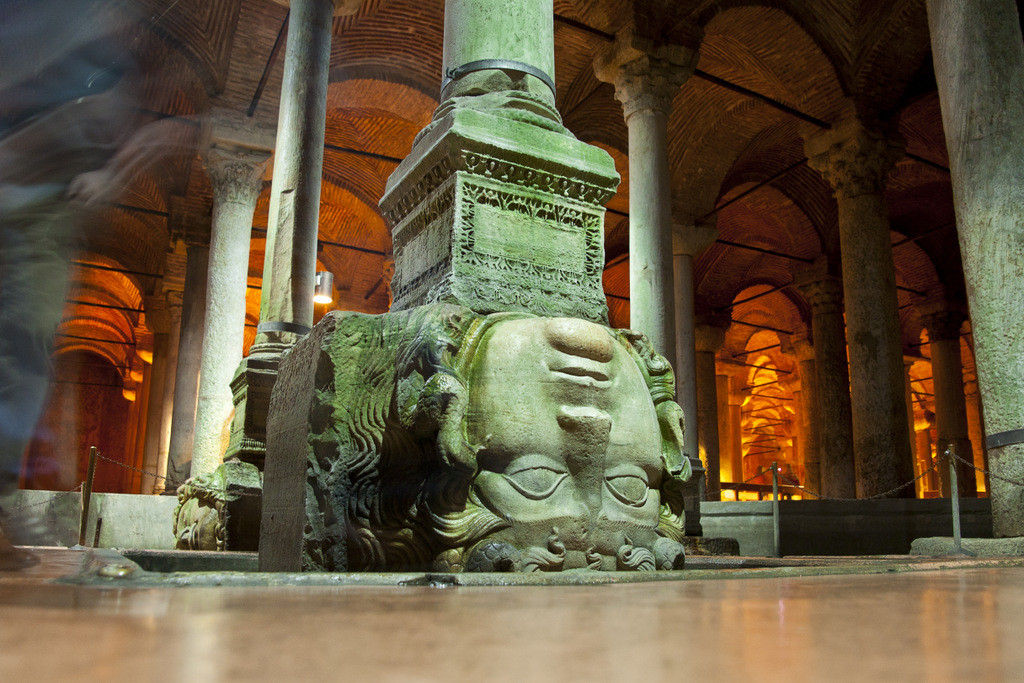Beneath the buzzing streets of Istanbul lies a quiet world of shadows and echoes — the Basilica Cistern. Built in the twilight of the Eastern Roman Empire, this underground palace of marble columns and dark waters has whispered its secrets for over 1,500 years. As lantern light glimmers across its still surface, you’ll feel the hush of history surrounding you.
Basilica Cistern entrance fee in 2026 is 1500 Turkish Liras. Please note that the Istanbul Museum Pass is not valid here. Visiting hours are daily from 09:00 in the morning until 22:00 in the evening. (Information last reviewed on January 11, 2026 — see more details under the relevant sections below.)
If you’d like to enter the Basilica Cistern quickly with a skip-the-line ticket, you can
book your online ticket in advance here
. This official option helps you bypass the long queues at the ticket counters, especially during the busy season.
Throughout the rest of this guide, you’ll find clear and practical advice to help plan your visit. Having worked as a professional tour guide in Istanbul for more than two decades, I’ve gathered here the most frequent questions from my guests — along with straightforward answers that will make your experience at the Basilica Cistern smoother and more rewarding.
📌 Basilica Cistern 2026 Visitor Summary
A practical overview for visiting the Basilica Cistern in 2026 — entrance fees, opening hours, and helpful tips.
🏷️ Ticket Price: 1500 TL (approx. €30) for tourists
⏰ Opening Hours: 09:00 – 22:00 (last entry at 21:00)
⏳ Average Visit Duration: 30–45 minutes
🙏 Closed: Open every day
🎫 Museum Pass: Not valid
🚀 Skip-the-line: Online tickets are recommended to save time (see the link below).
📍 Location: Sultanahmet, near Hagia Sophia
📅 Last Updated: January 2026
Byzantine Cisterns in Istanbul
There are hundreds of Byzantine cisterns in the Old City of Istanbul. If you look carefully, you will notice that there are cisterns with red brick ceilings visible even in Hagia Sophia Square or the second courtyard of Topkapi Palace.
Istanbul, formerly known as Constantinople, had been under siege many times in history. The city, which had the most powerful city walls of the Middle Ages, succeeded in lifting the siege each time. In military history, these walls are called Theodosian Walls.
However, it was not only the walls that were necessary during the sieges. It was very important to meet the water needs of the city people. Therefore, there are numerous cisterns under the Historical Peninsula of Istanbul.
Today, three Byzantine cisterns are open to visitors as a museum in Sultanahmet. One is the famous Basilica Cistern (Yerebatan Sarnici), the other is the recently restored Theodosius Cistern (Serefiye Sarnici). Apart from these two, there is another cistern called Cistern of Philoxenos (Binbirdirek Sarnici).
History of The Basilica Cistern

The history of the Basilica Cistern goes back 1500 years, when the Byzantine Empire was at the height of its power. It was built in the 540s during the reign of the Byzantine emperor Justinian.
Justinian, who ruled the Byzantine Empire from 527 to 565, was also the ruler who built Hagia Sophia. He is considered the most important ruler of the Byzantine Empire, which survived for more than 1000 years.
The Basilica Cistern is really amazing in size. Built in 138 meters and 65 meters in size, the cistern is the largest cistern in Istanbul with an area of 9800 m2. The Cistern was built to meet the water needs of the Great Palace of Eastern Roman Emperors.
1. Ancient Columns of Basilica Cistern

Inside the cistern, there are 336 reused columns from various ancient Greco-Roman structures. When you look carefully at these columns, you will notice that they are not made for this cistern and are of different shapes and lengths.
Some of the ancient columns of the Basilica Cistern are from the ancient Greek period, while others are from the Roman period. The Byzantines, on the other hand, gathered columns from the ruins of these periods.
2. Medusa Heads in the Cistern

As you move towards the bottom of the cistern, you will see that large stones were placed under the two very short columns for support. Medusa’s face was engraved on these stones.
For the architects who built the cistern, the rocks on which Medusa heads were engraved had no meaning. They told the workers to place the rocks under two columns shorter than the others. But in the 540s when the cistern was built, it had only been two centuries since Christianity had been accepted.
The figures of ancient Greek mythology still remained in the minds of people. The workers were afraid of Medusa, which turned everyone into stone. Therefore, they placed one of the Medusa heads on the side and one upside down.
3. Why is It Called Basilica Cistern?

There are various rumors about where the Basilica Cistern got its name. The most common of these is that the cistern was named as the Basilica Cistern because it was built under the square called Stoa Basilica, an important square during the Byzantine period.
Basilicas functioned as court buildings in the early Roman Empire. However, later, when Emperor Constantine accepted Christianity, they were converted into churches one by one.
The aim in doing this was to create a practical place of worship for the ever-increasing Christian community. Thus, for centuries, churches were inspired by the basilica plan.
Basilica Cistern Entrance Fee (2026)
Basilica Cistern entrance fee is 1500 Turkish Lira in 2026. The standard ticket covers daytime access. Please note that Museum Pass Istanbul is not valid for this attraction. During the evening hours (Night Shift), the entrance fee increases to 2400 TL. This information was last updated on January 11, 2026.
The “Night Shift” ticket is more expensive because, on some evenings, the Basilica Cistern hosts special events such as live music performances, contemporary art installations, or multimedia shows. While not every night includes such an experience, it’s a good idea to ask what’s happening on the evening you plan to visit. Even if there’s no event scheduled, exploring the cistern at night — when it’s quieter and less crowded — can be a good experience that some visitors find worth the extra cost.
🎟️ Skip the Line at Basilica Cistern
Basilica Cistern is one of the most popular attractions in Istanbul, and waiting times can be long, especially during peak hours. These two fast-track ticket options offer a faster and more convenient entry with either an audio guide or a combo deal that includes Hagia Sophia.
Highly rated by travelers • Mobile-friendly • Instant confirmation
Basilica Cistern Opening Hours (2026)
In 2026, Basilica Cistern is open daily from 09:00 AM to 6:30 PM. Additionally, there is a special Night Shift session from 7:30 PM to 10:00 PM, which requires a separate ticket. This information was last updated on January 11, 2026.
The visiting hours of the museums in Istanbul may change due to renovations or events. Before you go, I suggest you check the museum’s official site one last time.
How to Get to the Cistern?

The Basilica Cistern is located in Sultanahmet, the historical heart of Istanbul. You’ll find it just a stone’s throw away from Hagia Sophia, Blue Mosque, and Topkapi Palace — in fact, it’s tucked almost directly across from the entrance to Hagia Sophia. The entrance to the cistern sits at the beginning of Yerebatan Street, a short alley connecting Divan Yolu Avenue and Ayasofya Square. Just look for the small ticket booth and the modest crowd gathering near the steps descending underground.
If you’re walking around Sultanahmet, chances are you’re already just a few minutes away. The area is fully pedestrianized, and you can easily spot signs pointing to “Yerebatan Sarnıcı”, which is the Turkish name for the Basilica Cistern. If in doubt, just follow the stream of visitors flowing between Hagia Sophia and the tram station — they’re likely heading the same way.
To reach the cistern from Taksim Square, take the F1 Funicular from Taksim to Kabataş. From Kabataş station, transfer to Tram T1 heading toward Bağcılar, and get off at the Sultanahmet stop (about 15–20 minutes ride). From the tram station, it’s only a 3-minute walk to the Basilica Cistern. As you exit the tram, walk toward Hagia Sophia — the cistern will be on your left just before you reach the main square.
Then make sure to visit these other historical treasures nearby — each one offering a unique glimpse into Istanbul’s layered past:
- Hagia Sophia – A timeless marvel that bridges empires and faiths
- Topkapi Palace – The imperial residence of Ottoman sultans for 400 years
- Dolmabahce Palace – A dazzling 19th-century palace on the Bosphorus
- Blue Mosque – An iconic masterpiece of Ottoman architecture and faith
- Galata Tower – Enjoy breathtaking views of Istanbul from above
Conclusion
In the quiet depths beneath Istanbul’s bustling streets, the Basilica Cistern whispers stories of empires, mystery, and time itself. It’s not just a place you visit — it’s an experience that lingers long after you’ve climbed back to the surface.
After exploring this ancient underground world, take a moment to stroll through the serene courtyard of Hagia Sophia, just across the street. Or wander further into Gülhane Park, where sultans once walked, and enjoy a tea with a view of the Bosphorus.
If you’re curious to dive even deeper into the city’s hidden layers, consider visiting the Great Palace Mosaic Museum or the Archaeological Museums nearby — all within easy walking distance from the cistern.
And to round off your day, head toward Eminonu for some local street food, a bag of roasted chestnuts, or a boat ride along the Golden Horn. Because in Istanbul, history isn’t just behind glass — it flows around you like water under the stones.
Written by Serhat Engul
Hi! Thank you for all the very well explained information. Do you still do private tours? We would like to see the sites but not spend a 7 – 10 hr. day tour when still exhausted from travel. A 2 -day itinerary is what we prefer on Sept. 27 & 28, 2025. My husband and I will be cruising on Sept. 29, 2025.
Thank you very much for your kind message and interest in my tours. Unfortunately, I am already booked on September 27 and 28, 2025, and won’t be able to guide on those dates. I truly appreciate your consideration and wish you a wonderful time in Istanbul and on your upcoming cruise.
Hello, just a small update, March 2025, price for Yerebatan Sarayi is now updated
1400TRY (35 EUR) from 9:00 to 18:30 hours
2000TRY (50EUR) from 19:30 to 22 hours
Hello Ivo, thanks for the information. Prices change so frequently that sometimes I have a hard time keeping track. It was nice to get some help. I will update the post as soon as possible. Cheers.
Hi Serhat. I am a little confused with the ‘night shift’ as there is so little available information online. I understand it costs more but is the evening visit available daily or only during special events when there are concerts/displays?
Hi Erwin, yes it is possible to visit the cistern every day in the late evening with a more expensive entrance fee.
The reason why it was called “Night Shift” was that there were some additional services (activities and soft music concerts) in the cistern during these hours that were not available during the day.
However, I am not sure if these activities are still being carried out now. There used to be live music and modern art exhibitions, but now when I visit the cistern during the day, I no longer see the stands prepared for the evening.
I don’t think producing and presenting content for every evening is sustainable. However, as I said, it is still possible to visit at late hours.
Thank you Serhat. That’s really useful. I wish the Night Shift was available for booking online as with the daytime tickets.
You are welcome. Btw when purchasing a ticket, keep in mind that visiting the cistern at night will not add anything to your experience. The cistern is underground and does not receive sunlight, so it is the same during the day and at night.
Hi! What is the difference between normal ticket and skip the line ticket? The price that I see for both of them is mostly similar.
Hello Kriti,
There are generally two different entrances to museums in Istanbul. One of these is the entrance where people who want to buy standard tickets wait in line, and the second is the fast entrance where guided groups pass.
Those with skip-the-line tickets meet their guides near the museum and quickly enter the museum as a group through the guided group entrance – unless it is overcrowded.
If the museum is very crowded, there may be a queue at the guided group entrance. However, this crowd is generally very small compared to those waiting in line to buy tickets.
With a skip-the-line ticket, you not only enter the museum quickly, but also tour with a guide and hear the history of the building from the guide.
Hello,
Some sources say the Basilica Cistern is open to visitors until 10pm and yours says 6:30pm.
Do the opening hours extend to 10pm in the Summer months?
Thanks
Hi Mary, yes Basilica Cistern does indeed close at 18:30. However, according to a new system that has been implemented in the last few months, it reopens at 19:30.
Basilica Cistern is holding a new event called “Night Shift” from 19:30 to 22:00. There are some music concerts and special exhibitions between these hours.
However, if you visit the cistern between 19:30 and 22:00, there is a different price. In other words, according to the prices in April 2024, the normal ticket is 600 Turkish Liras, while the “Night Shift” ticket is 1000 Turkish Liras.
Hi! Is there any discount for foreign students or the ticket is flat fee for anybody? I’ve checked on “Passo” (the official seller) but I couldn’t figure it out.
P.S. I’ve noticed a significant increase in ticket prices (for other attractions as well) starting from this year: is it an inflation-response policy?
Hello, as far as I know, there is no discount for foreign students in museums in Istanbul. But I’m not 100% sure about this.
I couldn’t quite understand the price policy of museums in Istanbul this year. I think the prices are too high even compared to USD and Euro.
Hi. When will the Basilica Cistern open?
No official information has been given about when the Basilica Cistern will reopen. However, as it seems from the outside, the restoration has come to its final stage.